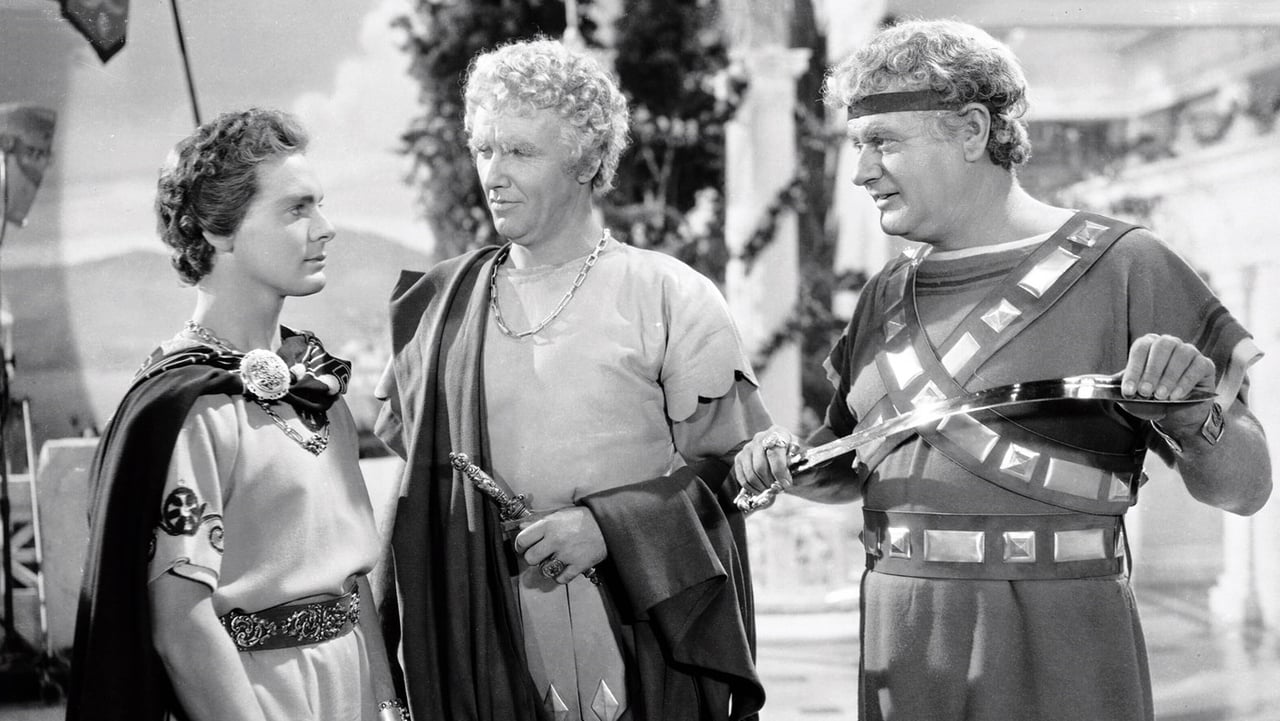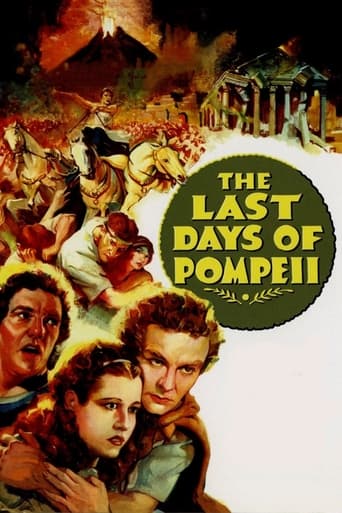

The Last Days of Pompeii will of course end with the great volcano. Until then, as you can guess, we get sword and sandals.However, in a style that reminds us somewhat of de Mille, we get fantastic imagery and spectacular scenes, along with epic historical characters.It does lack de Mille's brisk pace and comic relief, the comic relief provided by Overman and Tamirof in some of de Mille's best works.And it is probably the lack of timely comic relief that makes this lull, particularly in the first half.The second half is very brisk and crisp, however. It should make modern sword and sandal film makers very jealous.The imagery is perhaps even better than de Mille. The hunky statue of the gladiator in the final scenes is almost as striking as de Mille's use of female beauty, and even reminds us of the beautiful femme fatale of Northwest Mounted Police.Great acting, and most people will probably be most acquainted with the charismatic Basil as Pontius. His Pontius is a modern caring man. Indeed, the original Pontius was somewhere between the "thinker" and the "monster" and it seems no one wants to go in between the extremes. He savagely saw the Hebrews as a people not his own. However, odds are he did want to release Jesus. That doesn't make him less savage. It just means he was a strict "lawman", and Jesus wasn't the "punk" sort he felt needed to be crucified.The effects were astounding, and the extras should have gotten an all time Academy Award for best extras. They worked their butts off, and emoted better than most modern day stars.Crisp, brisk, full of art. With added comic relief and a brisker beginning, it would've easily been 10/10. This was a clever, well designed film, with characters we could care about.
... View MoreNo need to repeat the plot. Ordinarily this sort of costume spectacle would have been done by a big-budget studio like MGM or TCF. But the makers of King Kong (Cooper & Shoedsack) were special-effects wizards, so RKO put them to work again, hoping I guess for another box-office smash like Kong. I'm not sure why the movie flopped (IMDB), but apparently it did. The movie does lack big name stars, though Foster cuts a virile figure as the poor man who makes good. Plus, the middle part sort of sags as we await the big event.Then too, there's not the expected skimpy costumes or dancing girls to spice up the heavy religious message, suggesting someone should have called up that crafty old master of biblical spectacle, CB De Mille. In fact, there's little depiction of notorious Roman decadence outside of their blood sports. Thus, when judgment day comes, courtesy Mt. Vesuvius, there's not the usual satisfaction of seeing all the sinning and sinners get punished.Nonetheless, the special effects remain pretty impressive, even in our digital age. Too bad, however, we don't see more of that towering Goliath statue. It's still a real grabber. And when it comes crashing down, we get the message. Speaking of messages, if you're a skeptic like me, put off by the heavenly choirs and ethereal lighting, take the narrative as a worthwhile morality tale instead of Hollywood's proved pathway to heaven.
... View MoreAlthough never entirely flawless, THE LAST DAYS OF POMPEII ('35) was an ambitious undertaking for RKO to take at that time. The storyline, about a bitter blacksmith who turns gladiator, is really a morality tale wrapped up in biblical settings and given the usual "cast of thousands" publicity by the studio that spent a lot of money in recreating Ancient times.PRESTON FOSTER was never a particularly charismatic actor, often accused of being "wooden", but there's a sincere element about his performance here that allows the film to work. So too does BASIL RATHBONE, giving some extra dimension to his take on Pontius Pilate.Interesting to catch a glimpse of WARD BOND as a gladiator--an actor who has appeared in so many classic films it's almost amazing to realize he was kept as busy as he was.With Max Steiner supplying the score, it's a lesser known gem that makes for enjoyable viewing even if it comes off as a cross between BEN-HUR and THE ROBE and lots of other stories dealing with the effect of the crucifixion on men's lives and their search for the truth.
... View MoreI wonder how many of you read any of these novels: THE CAXTONS, THE LAST OF THE BARONS, MY NOVEL, PAUL CLIFFORD, EUGENE ARAM, THE COMING RACE. Any takers out there? Well how about PELHAM (which has nothing to do with an 18th Century British Prime Minister, nor an area of the Bronx near the Connecticut Border)? No? Well, how about THE LAST DAYS OF POMPEII? Bet you heard that title somewhere? It has been the subject of about seven or eight major productions in the movies from the silent period (a major full length version by the Italians in 1913 or so - which was a flop) to a television version in 1985 (that remains something of a critical joke to this day - all 240 odd minutes of it). Most people agree that of all the versions of the story, the 1935 version starring Preston Forster and Basil Rathbone (as a sad, philosophical Pontius Pilate) is the best. That it is basically entertaining is true. That it jettisoned the novel by Edward Bulwer-Lytton is equally true. That the novel is unreadable today is also true.Bulwer-Lytton has become, in a small way, a literary immortal from Victorian England - actually from late Regency through Victorian England). He was a wealthy landowner and aristocrat, who would be in the British cabinet as Secretary of State for the Colonies in the middle 1850s. He was the father of a would-be poet, who rose to be Viceroy of India. Lytton was a baronet when he started writing in 1825, and would eventually be an Earl (First Earl Lytton). He wrote all the titles (including THE LAST DAYS OF POMPEII) which I mentioned. Only PELHAM, his novel of Regency England's aristocracy (which he knew well) and THE LAST DAYS are still reprinted. That's because (as his own contemporaries - especially the greatly amused Thackeray noticed) Lord Lytton's ideas out paced his abilities. He wrote bad prose. A "Bulwer-Lytton" prize is now presented every year to those writers who write the worst, cliché-full opening paragraph for a novel. It is named for him because of the start of his novel EUGENE ARAM: "It was a dark and stormy night...." He tried to be original in his concepts. EUGENE ARAM was based on the 18th Century schoolteacher, linguist, and murderer (hanged in 1759). Lytton tried to make a case that Aram's philosophical beliefs allowed him to take the blame for the murder he was hung for. The story sold well in the 1830s, but it met with mostly critical rejection. In MY NOVEL, his villain, Baron Levy, actually has a very human reason for his improbably complicated vengeance on two men: he's angry of their attentions to a woman he loves. Levy is Jewish, so it was a curious thing to make his motivation so mundane as love for a woman - but Bulwer spoiled it shortly after by adding the image of a vengeful Jew who had been insulted. That was always the problem with Bulwer-Lytton. He's a literary Ed Wood, in that his concepts outstrip his abilities (and in comparison Wood is more bearable - one of his movies lasts about an hour or so, while Bulwer can write a novel of over 700 pages!). The reason THE LAST DAYS OF POMPEII happened to have a long shelf life is that the subject (the small town near Naples that was buried in a sea of ash and lava by Vesuvius, and rediscovered preserved 1,700 years afterward) fascinates us, and to his credit Bulwer did his classical history homework. But as a piece of fiction his characters are dry as dust. One of the more interesting is a wealthy Egyptian who plans to take over the Roman Empire. He's the villain in the plot. The events that destroyed Pompeii are clearly revealed to us, including the earthquake that hit the town a decade before the volcanic eruption.So when the movie was made they wisely jettisoned the actual story line (which I plowed through when I read the boring novel about 1985). Foster is a blacksmith who becomes a successful gladiator, and then a wealthy land owner near Pompeii. Early he lived in Judea, and met Christ, and he (like his old patron Pilate) are aware of an alternative to the materialist and corrupt empire. The film is old fashioned, but bearably so, and gave Foster one of his best screen performances (his retired police captain in KANSAS CITY CONFIDENTIAL is it's closest rival). Never a leading man in major productions, Foster demonstrated here that he could handle lead roles. Except for an occasional film though he usually was in supporting parts. For his performance, and Rathbone's Pilate, and for jettisoning Bulwer's idiot writing and plot, I'll give this an 8.By the way, if you want to see an interesting, literary view of the later life of Pilate - by a Nobel Prize Winner no less - read the short story, THE PROCURATOR OF JUDEA by Anatole France. Far from being so thoughtful and sad as Rathbone's Pilate acts, France's version of the Procurator seems more realistic regarding his memories.
... View More